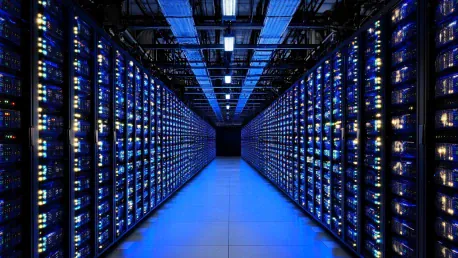The expansion of Crusoe’s AI data center at the Lancium Clean Campus in Abilene, Texas, marks a significant milestone, echoing the company’s dedication to technological innovation and environmental stewardship. Initiated in mid-2024, the project is set to complete its second phase by mid-2026, expanding the campus to a total of eight buildings and nearly 4 million square feet.
Major Project Expansion and Infrastructure
Crusoe’s ambitious project will introduce six additional buildings, enhancing the campus’s capacity and efficiency. With a total power capacity of 1.2 gigawatts (GW) and ongoing construction for 1.6 GW, the initiative is projected to revolutionize AI infrastructure. Each building is designed to support up to 50,000 NVIDIA GB200 NVL72s, promising significant advances in data center efficiency and AI capabilities.
The first phase, launched in June 2024 and anticipated to go live in early 2025, comprises two structures spanning 980,000 square feet capable of delivering over 200 megawatts. This phase sets the foundation for the campus’s high performance and energy efficiency. These buildings will employ state-of-the-art technology to ensure optimal performance, showcasing Crusoe’s commitment to integrating the latest advancements in AI and data processing.
As construction progresses, Crusoe’s focus on scalability and adaptability is evident. The campus will feature a single integrated network fabric to streamline operations across multiple facilities, ensuring seamless communication and data transfer. This design allows for the efficient management of AI training and inference workloads, setting a new benchmark in data center architecture. Additionally, the expansion aligns with Crusoe’s broader vision to enhance AI infrastructure, providing robust support for future technological developments.
Economic and Employment Impacts
The expansion is not only a technological feat but also an economic stimulant for the Abilene community. Currently employing around 2,000 individuals, the project is projected to engage nearly 5,000 workers at its peak. The Development Corporation of Abilene predicts a direct and indirect economic impact of approximately $1 billion over 20 years, with this figure expected to multiply as the project progresses.
Local leaders have expressed their support, emphasizing the project’s potential to enhance community welfare through job creation and increased tax revenue. These benefits are anticipated to bolster essential county services and support local families’ futures in West Texas. The influx of workers and subsequent economic activity will drive local businesses, fostering a vibrant economy and long-term growth. Such large-scale investment underscores the project’s transformative impact on the region.
Prominent figures such as Abilene Mayor Weldon Hurt and Taylor County Judge Phil Crowley have praised the expansion. Hurt emphasized the project’s role in helping families build their futures, while Crowley highlighted the additional tax revenue’s potential to improve county services. Misty Mayo, President and CEO of the Development Corporation of Abilene (DCOA), reiterated the project’s substantial contribution to economic growth and job creation, signaling a new era of innovation for Abilene.
Technological Innovation and Sustainability
Crusoe’s commitment to sustainability is evidenced in its integration of cutting-edge technology and renewable energy solutions. The AI data center in Abilene will feature NVIDIA’s advanced computing platform for superior AI training and inference capabilities, aligning with the company’s sustainability principles. This integration leverages sophisticated tools to deliver enhanced performance while adhering to environmentally responsible practices.
Lancium’s involvement ensures a robust infrastructure with renewable energy interconnects, battery storage, and solar resources. This setup will support a steady and sustainable power supply, leveraging local wind resources and incentivizing new greenfield renewable power projects to enhance grid reliability and minimize carbon output. Crusoe’s deployment of direct-to-chip liquid cooling systems, characterized by zero-water evaporation, showcases an innovative approach to maintaining operational efficiency while conserving water resources.
Additionally, the campus architecture will incorporate innovative designs to ensure grid reliability under elevated workloads. Behind-the-meter battery storage and solar solutions will optimize economic and carbon outputs, reinforcing Crusoe’s dedication to environmental sustainability. This multifaceted strategy reflects the company’s comprehensive vision for sustainable operations, aiming to reduce carbon emissions and promote renewable energy adoption.
Given Crusoe’s climate-focused mission, site selection was heavily influenced by the availability of low-carbon energy. The data center will be outfitted with natural gas turbines to provide a reliable backup power supply. These elements collectively pivot towards a greener and more sustainable operational model, maintaining Crusoe’s reputation as a leader in both technology and environmental stewardship.
Community and Industry Contributions
Crusoe’s expansion of its AI data center at the Lancium Clean Campus in Abilene, Texas, signifies a major milestone, highlighting the company’s commitment to both technological progress and environmental responsibility. The project kicked off in mid-2024 and is slated to finish its second phase by mid-2026. This expansion will increase the campus to a total of eight buildings, covering nearly 4 million square feet. Such large-scale growth underscores Crusoe’s ambition to be at the forefront of tech innovation while also adhering to sustainable practices. The Lancium Clean Campus offers an eco-friendly environment, crucial for housing advanced technology without compromising on environmental commitments. By focusing on both tech and sustainability, Crusoe aims to set new industry standards. The completion of this project will greatly enhance their capability to handle AI workloads, driving both the company and the technology sector forward in significant, eco-conscious ways. This project underlines the importance of merging tech development with ecological responsibility.









